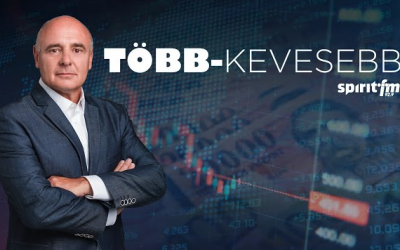Collective effort is needed to protect our digital ecosystem
Cybercriminals caused damages worth 30 billion forints in Hungary last year. While active across all industries, their activities pose a particularly high risk to the online retail sector. According to Mastercard’s recently published and large-scale study – filling a long-standing gap in the field – 43% of online marketplace users have experienced some form of fraud attempt, and one in five lost money or data as a result. The research explored the state of cybercrime in Hungary from the perspectives of users, companies, and cybersecurity professionals. Globally, the cost of cybercrime reached $9.5 trillion by the end of 2024, and by 2028, it could soar to $13 trillion—more than 60 times the size of Hungary’s GDP.
Nearly half of the Hungarian population (48%) has been directly or indirectly affected by fraud, yet only around one-fifth (22%) feel adequately prepared to defend themselves against such threats. While 70% of adults know that a bank would never request card details or login credentials by phone or email, numerous crimes occurred last year in which victims were defrauded of over HUF 10 million forints in this way. Despite multi-factor authentication and well-designed security systems, the weakest link is still the emotionally pressured, unprepared, or convenience-seeking user with limited awareness of security risks.
Nevertheless, the false sense of security pervades Hungarian society. Although tens of thousands fall victim to fraud annually and the total damage runs into tens of billions of forints, even the most “digitally savvy” 18-29 age group scores poorly on actual digital security knowledge. According to The Age of Cybercrime 2025—a study initially made available by Mastercard to banks and organizations involved in the Kiberpajzs initiative—the knowledge level of this age group barely reaches 1.5 on a four-point scale. The report emphasizes that the alarming growth of cybercrime can only be curbed through collective action, collaboration, and continuous knowledge sharing.
In Hungary, there is a significant intention-action gap between cybersecurity knowledge and digital behaviour. 46% of users cannot distinguish real messages from service providers or merchants from fraudulent ones. Younger generations tend to overestimate their security awareness due to their confidence in digital technologies. Although 90.5% of 18-29-year-olds believe they are difficult to deceive, their average score on a 10-question digital security test was only 1.5 out of 4. Interestingly, the older the respondent, the less confident they feel in their preparedness against digital fraud—yet older age groups actually performed better in the test.

The increasing number of successful fraud attempts and other cybercriminal activities pose a serious reputational risk, threatening the very trust on which online commerce and digital payment ecosystems are built. Among small and medium-sized enterprises that fall victim to cyberattacks, 60% cease operations within six months due to the damages suffered. Currently, the public sector faces the highest level of threat from cybercriminals, while threats to the healthcare sector have decreased. However, the technology sector has become increasingly targeted since the pandemic.
We explore how automation and AI have transformed the threat landscape, enabling attackers to launch high volumes of sophisticated attacks. The analysis reveals the changing nature of cybercrime, with criminals collaborating and innovating to launch more effective attacks. The study emphasizes the need for information sharing and collaboration across sectors to enhance cybersecurity resilience. Practical recommendations for improving cybersecurity education and awareness are also provided, stressing the need for a collective effort to protect our digital ecosystem. The Age of Cybercrime 2025 document is a crucial resource for understanding the current cybersecurity landscape and offering actionable insights for market players to strengthen their cybersecurity strategies and resilience. Let us take these insights and turn them into action to safeguard our digital future.
DHL 2025 E-Commerce Trends Reports
A DHL bemutatta az első globális e-kereskedelmi üzleti jelentését: AI, social commerce és a fenntarthatóság vezetik a 2025-ös trendeket A riport exkluzív betekintést nyújt abba, hogyan értékesítenek, növekednek és boldogulnak a vállalatok a gyorsan változó digitális...
DHL 2025 E-Commerce Trends Reports
DHL unveils first global e-commerce business report: AI, social commerce & sustainability lead 2025 trends The report offers an exclusive look at how companies are selling, scaling, and succeeding in today's rapidly evolving digital landscape, driven by...
HungarEcomm Stars 2025
Who are the most Globally Competitive Hungarian Webshops in 2025? A narrow elite is setting the pace in Hungarian e-commerce: for the second time, the HungarEcomm Stars Award has been presented to companies that are not only successful locally but also capable of...
HungarEcomm Stars 2025
Ezek a legvilágpiacképesebb magyar webshopok 2025-ben Szűk élboly diktálja a tempót a magyar e-kereskedelemben: második alkalommal adták át a HungarEcomm Stars Díjat azoknak a vállalatoknak, amelyek nemcsak itthon, hanem a nemzetközi színtéren is képesek versenytársa...
Hungarian E-Commerce Under Global Pressure
How Hungarian E-Commerce Can Stay Competitive in the Global Online Market “As of today, the playing field strongly favors retailers who can serve multiple countries,” highlighted Norbert Madar, Vice President of the Digital Commerce Alliance, in a recent interview...
Globális nyomás alatt a magyar e-kereskedelem
Globális nyomás, helyi válaszok: merre tart a magyar e-kereskedelem? „Ma már erősen lejt a pálya a több országot kiszolgálni képes kereskedők felé” – hangzott el Madar Norbert, a DKSZ alelnöke (és egyben a a PwC digitális kereskedelmi területekért felelős, vezető...




